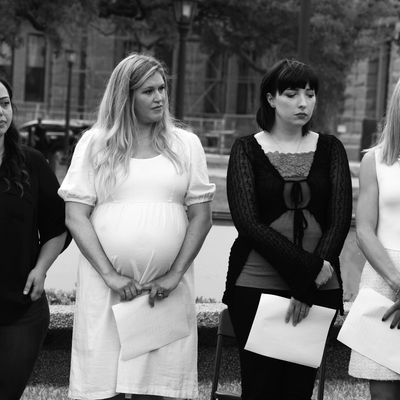
The Texas Supreme Court unanimously ruled on Friday against 20 women who filed a lawsuit after being denied medically necessary abortions, arguing that the exceptions currently spelled out in the state’s abortion ban are sufficiently broad and that doctors who refuse to offer abortion care when a pregnant person’s life is in danger misunderstand the law.
The decision, issued by nine Republican justices, rejected the plaintiffs’ argument that the exceptions are vague enough that Texas physicians are turning away patients with critical pregnancy complications for fear of prosecution or civil liability. The state currently outlaws all abortions except in instances of narrowly defined medical emergencies, and those who violate the law could face life in prison in addition to a civil penalty of no less than $100,000. (The law, in theory, exempts abortion seekers themselves from prosecution.)
The women who sued included lead plaintiff Amanda Zurawski, who nearly died of sepsis after she was denied an abortion and whose ability to have children has been compromised as result of the infection; Kiersten Hogan, who had a stillbirth at 19 weeks after her water broke and a hospital refused to terminate the pregnancy; and several women who were forced to stay pregnant despite fatal fetal conditions, or were forced to travel out of state for abortion care amid their medical emergencies.
The case, Zurawski v. State of Texas, was the first legal challenge of its kind since the Supreme Court overturned Roe v. Wade nearly two years ago. The plaintiffs, which also include two doctors and who were represented by the Center for Reproductive Rights, had sought a temporary injunction that would suspend enforcement of the state’s abortion bans while the exceptions were clarified. (Similar suits are ongoing in Idaho and Tennessee.)
The Texas Supreme Court had foreshadowed its thinking in December, when it ruled against Kate Cox, a woman who sued the state asking for permission to terminate her unviable pregnancy because it put her future fertility and life at risk. She was forced to leave Texas to get an abortion elsewhere.
In their decision on Zurawski, the justices threw out a lower-court ruling that would have clarified what circumstances qualify for an exception under the state’s abortion ban. The judges also did not mention any of the patients in their decision, instead writing that only Dr. Damla Karsan, one of the plaintiffs who is an OB/GYN, had standing to sue.
“This ruling does not provide any real clarity to doctors, and it is deeply offensive to the women we represent — they are completely written out of the opinion as though they don’t exist or matter,” Nancy Northup, president and CEO of the Center for Reproductive Rights, said in a statement. “Of course women on death’s door should have the most basic right of bodily autonomy to protect their life and health. So too should those with pregnancies that pose serious risks to their physical and mental health, like those with lethal fetal conditions.”
Plaintiff Samantha Casiano was forced to continue her pregnancy after her daughter, Halo, was diagnosed with anencephaly, because the serious birth defect did not qualify for care under Texas’s abortion ban. Halo was born in March 2023 at 33 weeks and died four hours later. During her testimony last July, Casiano became so upset on the stand that she ended up throwing up.
In its ruling, the court said that people like Casiano who will lose their pregnancies due to fatal fetal conditions are not eligible for abortion care, unless they also have a life-threatening condition.
“I don’t know how the court could hear what I went through and choose to do nothing,” Casiano said in a statement. “Texas lawmakers claim to care about protecting ‘the unborn,’ but in reality they made my family suffer. I joined this case to make sure no other family goes through that, and I’m devastated that the court is allowing this cruelty to continue.”
The Cut offers an online tool you can use to search by Zip Code for professional providers, including clinics, hospitals, and independent OB/GYNs, as well as for abortion funds, transportation options, and information for remote resources like receiving the abortion pill by mail. For legal guidance, contact Repro Legal Helpline at 844-868-2812 or the Abortion Defense Network.





